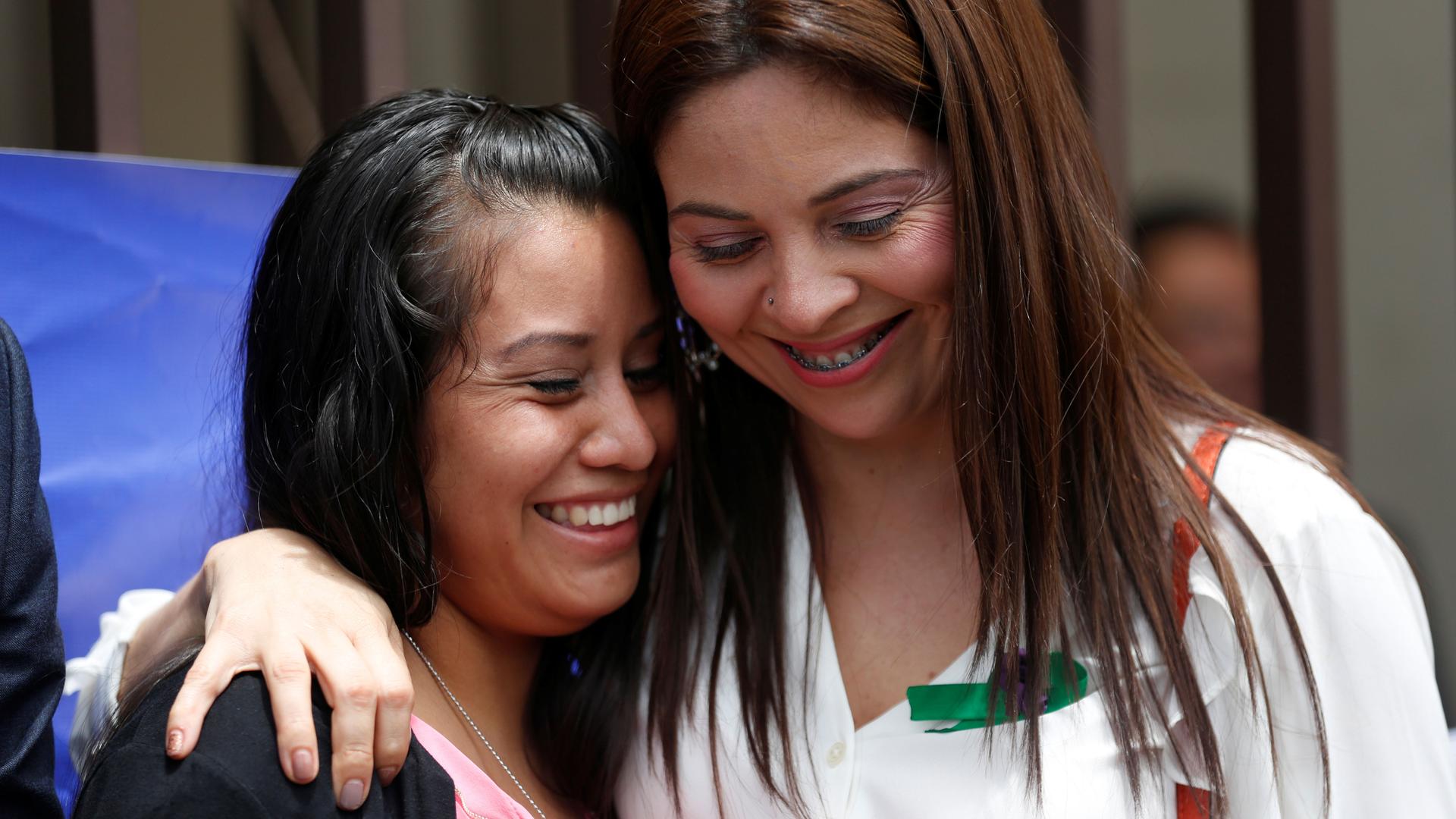El Salvador abortion laws offer warning for the US, lawyer says
Evelyn Hernández, who was sentenced to 30 years in prison for a suspected abortion, attends a hearing in Ciudad Delgado, El Salvador, on Aug. 19, 2019.
A Salvadoran court on Monday acquitted a woman accused of homicide after giving birth to a stillborn baby in a case that drew international attention to the socially conservative nation’s strict abortion ban.
Evelyn Hernández, 21, was previously convicted of intentionally inducing an abortion and had already served three years of a 30-year prison sentence.
“Thank God, justice was done,” Hernández, in tears, told a cheering crowd outside the courthouse. “There are many women who are still locked up and I call for them to be freed soon, too.”
Related: El Salvador woman denied abortion delivers dead baby in C-section
In February, the Supreme Court ordered Hernández released and retried, saying that the original judge’s decision was based on prejudice and insufficient evidence.
Hernández was raped by a gang member and said she was unaware of her pregnancy until just shortly before she gave birth to a stillborn son in April 2016.
“This is a resounding victory for the rights of women in El Salvador,” Erika Guevara-Rosas, Amnesty International’s Americas director, said about the verdict.
Some 147 Salvadoran women have been sentenced to up to 40 years in prison in such cases between 2000 and 2014, according to the Citizen Group for the Decriminalization of Abortion, a local rights group.
Related: As more women are incarcerated in Mexico, so are their babies
The group said it will seek fresh reviews of at least 16 similar cases.
Women prosecuted under El Salvador’s hard-line abortion laws include those who have suffered stillbirths after home deliveries as well as abortions induced because of medical emergencies.
Hernández’s case attracted international attention and came nearly three months after President Nayib Bukele took office pledging a softer approach to abortion in a country that bans any intentional termination of a pregnancy.
The World’s Marco Werman spoke with Paula Avila Guillen, who directs the Latin America initiatives at the Women’s Equality Center and worked closely with Hernández’s defense team in San Salvador.
Marco Werman: Tell us the story of Evelyn Hernández. I know you’ve spent time with her. Who is she and how did she land in prison?
Paula Avila Guillen: Unfortunately, she got raped and she kept bleeding during all of her pregnancy and to the point that she didn’t even know that she was pregnant. Nobody in her family realized that she was pregnant because she didn’t develop typical symptoms of pregnancy. And anybody who arrived at the hospital under the suspicion of having had an abortion is denounced immediately to the police. But the story of Evelyn is unfortunately not unique — it’s very similar to the story of 15 other women who remain imprisoned … [They are] women who come from very poor backgrounds where the system has already failed them. They don’t have the money to pay private attorneys when they are interrogated at their hospital beds.
So she stood trial, then appealed the guilty verdict, but what did the prosecution argue?
They were trying to argue something that will be closer more to negligence or criminal negligence. However, they were still charging her under the oversight law and they were asking up to 40 years in prison. However, because of the international attention, and because of a strong legal team, we were able to present Evelyn’s story at the trial and have a deeper interrogation of the case … Somebody who had lost blood and was unconscious and delivering at home just didn’t have the legal criminal capacity to commit a crime. And the evidence was just there.
What would you say is the relevance of this case in El Salvador for women in the US today?
I live in the US, I am an attorney — here and in Latin America — and I just always compare Salvador to what can happen if we don’t pay close attention here in the US. El Salvador used to have exceptions to this law until 1998: There were some exceptions, there were no cases of criminalization of women. There wasn’t social cruelty in the system, but, just like that, the system completely changed. And … we as activists need to see El Salvador as a warning of what happens when laws are changed and when women and girls’ rights are just not taken seriously and are not given priority. We have heard of some of the bans that they are trying to pass in Alabama and Georgia, and they are harsh, if not harsher, than the ones that there are in El Salvador.
What about the future for Evelyn Hernández? She’s acquitted but she’s just 21, and she’s already spent more than two years in prison. Can she move on?
We hope that she will. She has a lot of support. She cried all night yesterday out of relief and happiness. I feel that she has been so strong, and finally all her emotions came out and she now she can move on with her life. She wants to finish high school and she wants to study. It’s going to take a while for her to process all of this and to heal from this trauma. But we are there to support her and we are going to be with her all the way, until she feels ready.
This interview was edited and condensed for clarity. Reuters contributed to this report.
